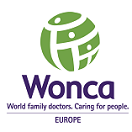WONCA Europe Bratislava conference statement
 The Human Side of Medicine
The Human Side of Medicine
Learning what it's like to be a patient and what it's like to be a physician
As family doctors, we become intimately involved in the life of the families we provide care for. There is an element of emotion to every interaction with our patients – sadness, joy, anger, denial, frustration, acceptance, hope or amazement. Often, we suppress these feelings as we go through our busy days. But occasionally, we are touched deep within, and forced to experience the realities of life and loss.
In the practices of family doctors across our region, an increasing amount of time is spent in front of computers. As a result of policies, the need to record and to render information accessible to several parties, and the transition to digitalised reporting, the work of family doctors revolves significantly around screens rather than on the side of the patient. Another troublesome evolution takes place as commercial interests and the continuous high investment in specialised secondary and tertiary care contrasts the general acceptance among stakeholders that primary care is the optimum way to deliver efficient and effective healthcare.
Under these circumstances, and while we strive to provide the best quality and safe care, errors and adverse events can happen. Family doctors are only humans and the experience can be humbling and painful.
How can we ensure our digital tasks provide value to whom it really matters: the patient? In our times of intense scientific research and technological change, the human side of medicine is becoming more and more important.
The human side is of profound value to patients and physicians alike.
In the conclusion of the 24th WONCA Europe Conference, we acknowledge that family doctors must work on human and personal lifelong relations with their patients. Fostering open relationships and investing more time with the patients help family doctors increase the quality of prevention and care.
To cultivate these crucial elements, we should:
a. establish a close collaboration with governments, policy-makers and non-governmental organisations, to promote a better understanding of the nature and core services of family doctors and their central role in primary health care, and increase the human resources where necessary;
b. work closer with educational institutions and current and future students of medicine;
c. continue taking care of and comforting our patients by tailoring treatment and avoiding over-diagnosis and over-treatment, as well as under-diagnosis and under-treatment;
d. develop an action plan and collaborate with all parties to improve the conditions of work of the primary health care workforce to ensure their social and mental wellbeing.
Finally, we shall all remember the words of Hippocrates: “It is more important to know what sort of person has a disease than to know what sort of disease a person has.” There is no computer algorithm that can attain that.